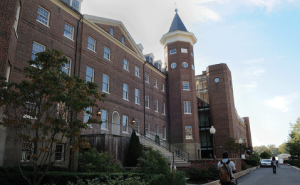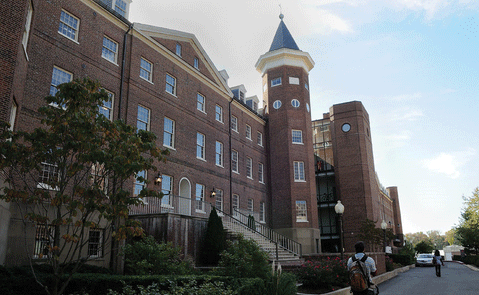
Five undergraduate students have declared majors in African American studies, a program that launched this fall alongside an African American studies department as part of multiple commitments made to address racial injustice at Georgetown.
Five undergraduates have declared an African American studies major in the program’s first semester, according to African American studies Program Director Robert J. Patterson.
The students are juniors and seniors.
Another 20 students have declared a minor during the course of the semester. The minor was originally introduced in 2005.
The major launched this fall. A minor program has been a part of the College since 2003, offering a series of elective courses.
Students majoring in African American studies must complete 10 courses, including “Introduction to African American Studies,” “Methodologies and Theoretical Issues in African American Studies” and seven elective courses in the department.
Sierra Cribb (COL ’18), who declared the major this semester, said she was interested in learning more about her own identity.
“I realized that my interests as an African-American woman were starting to align with learning more about what it means to be an African-American woman and what that looks like in a place like Georgetown, a predominantly white space,” Cribb said.
University President John J. DeGioia announced the creation of an African American studies department and major Feb. 4 as part of a series of commitments to address racial injustice at Georgetown. African American studies had previously been an interdisciplinary program since 2003.
Patterson highlighted the importance of the African American studies department at Georgetown.
“There is recognition of the importance of African American studies as an academic discipline, being on the forefront of interdisciplinary knowledge production,” Patterson said. “Thinking about the history, the cultural and economic factors that have led to racial stratification is one example, but as important to the ways that black cultural production has been critical to advancing this conversation.”
Last September, the African American studies program and the Provost’s Committee on Diversity created a petition to establish the major. Twelve sections of the “Introduction to African American Studies” course have been offered over the past seven years and have been overenrolled three times, according the university website.
Though Patterson said Georgetown has lagged behind other institutions of similar prestige in fostering scholarly engagement with African-American history, society and culture, he said he considers the creation of the major to be a sign of progress.
“The earliest ethnic studies program was born in the late ’60s,” Patterson said. “Georgetown got its African American studies program in 2003. So that gives you a sense of where it is on the trajectory.”
Patterson noted Georgetown’s significant progress toward greater racial justice over the past decade.
“Even at this later entrance, Georgetown is making the strides to commit the resources to develop the African American studies department into a first-class institution comparable to the institutions that have had it for 30, 40 years as well,” Patterson said.
Georgetown College Dean Chester Gillis said the university’s decision to confront its own history with slavery heightened the need for the academic program. DeGioia announced a series of efforts Sept. 1 to address Georgetown’s profiting from the sale of 272 slaves to a Louisiana plantation in 1838, including offering descendants of the 272 slaves legacy status in admissions.
“The work on this major began before the university initiative on Slavery, Memory and Reconciliation, but now takes on increased importance in light of this groundbreaking work at the university level inspired by President DeGioia,” Gillis wrote in an email to The Hoya.
Gillis said while he cannot completely gauge the popularity of the major at the moment, students’ excitement suggests a positive future for the program.
“Students have demonstrated interest in this major,” Gillis wrote. “How that interest translates into students electing to take the major remains to be seen, but I am optimistic that there will be a critical mass.”
Patterson said multiple freshmen are on track to declare the major in their sophomore years.
“There are a lot of first-year students who we’ve met and worked out a planning sheet; first-year students can’t declare the major yet, but they are on the path to declare in their sophomore year,” Patterson said.
Both Patterson and Gillis said the focus of the department right now is to hire more professors to increase class offerings and attract more students.
“We are hiring new professors for this department, which will increase the class offerings and this should also drive traffic to the major,” Gillis wrote.
Though he did not rule out the possibility of modifying the curriculum in the future, Patterson said the department is not yet at the stage of being able to accurately evaluate the program.
“We haven’t even completed a semester with it. We know that, going forward, we will modify the curriculum to ensure that the department is providing a greater number of courses,” Patterson said. “That’s a consequence of our expanding the faculty.”
Patterson said the program looks to shift the focus of historical and cultural analysis away from traditional, Euro-centric study to analysis focused exclusively on African-American studies.
“It decenters the European ideas and values as being the norm — the aspirational values as well,” Patterson said. “We’re interested in training students in the methodologies of African-American studies, in the epistemologies of AfricanAmerican studies, and not to become docile subjects but to become active innovations and interrogators of the future of the world they live in.”
Cribb also said she hopes to see current freshmen advance their interest in the program to the point of declaring a major or a minor.
“I hope their interest right now will develop into a pursuit of a major or minor or further studies, because I think that Georgetown and Dr. Patterson and the department and the faculty and staff are working diligently to develop something really great,” Cribb said. “I hope people take advantage of it.”





















